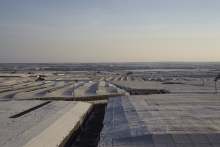In 2007, violence broke out across Kenya after the disputed re-election of President Mwai Kibaki. Attackers assaulted hundreds of Unilever workers and their families on a tea plantation in Kericho, Western Kenya, owned by a subsidiary of the company. The workers say that seven people died, over fifty others were raped and many seriously injured.
Unilever is accused of failing to support them. Under the UN’s guiding principles on business and human rights - which the multinational corporation has endorsed - companies are obliged to remediate any human rights abuses to which it has contributed.
The workers say that the company instead temporarily closed the plantation, sent workers home and failed to pay them for six months, “exacerbating their situation”. At the time, more than 10% of Unilever’s global workforce was employed on the plantation.
The complaint says: “This was the most serious known case of human rights abuse suffered by the largest concentration of Unilever workers anywhere in the world.”
Unilever is accused of “relentlessly hid[ing] behind its corporate structure” to avoid legal redress. The group of 218 workers is calling on the UN working group on business and human rights to demand that Unilever make remediations.
Avoiding redress
It’s not the only time that Unilever has spent years refusing to remediate those affected by its failings.
It wasn’t until 2016 that the company compensated workers who were said to have been poisoned after mercury waste was dumped on land behind a thermometer factory in Tamil Nadu, India, owned by a subsidiary of the company, despite being forced to shut the factory in 2001 after the contamination was found by state authorities.
The union representing some of the factory workers alleged that 45 employees and 18 children had died due to the toxic effects, a claim denied by the company. The union stated in 2016 that some were still suffering from renal, brain and neurological disorders.
In 2015, workers said that they had been promised compensation but that the company had failed to follow through. In response, Unilever denied that contaminated glass waste had been dumped behind the factory and that there had been any “adverse impacts on the health of employees or the environment”.
591 ex-employees and their families eventually reached a settlement with Hindustan Unilever Limited (the Indian arm of the company).
Ongoing workers’ right abuses at Unilever?
Over the past decade, Unilever appears to have taken some steps to address workers rights issues in its supply chain. In 2016, the company received Ethical Consumer’s middle rating for Supply Chain Management, improving from our worst rating in the previous year. Yet, reports from workers of ongoing violations have continued both from its own employees and in its supply chain.
In 2019, the Food and Allied Workers’ Union stated security forces hired by Unilever had attacked striking workers with rubber bullets, pepper spray and paint balls while they were peacefully picketing a Unilever facility in Durban, South Africa. The union stated: “"Four of our members were seriously injured and two of them have opened criminal cases against the security guards in question. Workers were brutally shot at when simply attempting to go to their cars parked on premises agreed on between the parties.”
The company has also been repeatedly criticised over abuses in its palm oil supply chain. In 2016, the company was found to be buying palm oil from Olam and Wilmar, companies linked with both deforestation and human and workers rights abuses. Olam has been accused of acquiring land and palm oil from smallholder farmers in the Republic of Gabon who had been refused the right to free, prior and informed consent to the deal, according to Rainforest Foundation UK.
Amnesty International found serious human rights abuses on the plantations of Wilmar and its suppliers. These included forced labour and child labour, gender discrimination, as well as exploitative and dangerous working practices that put the health of workers at risk.
Clearly the company has some work to do not only in ensuring workers’ rights in its supply chain, but in addressing the impact on its tea plantation workers for its historical failings.






